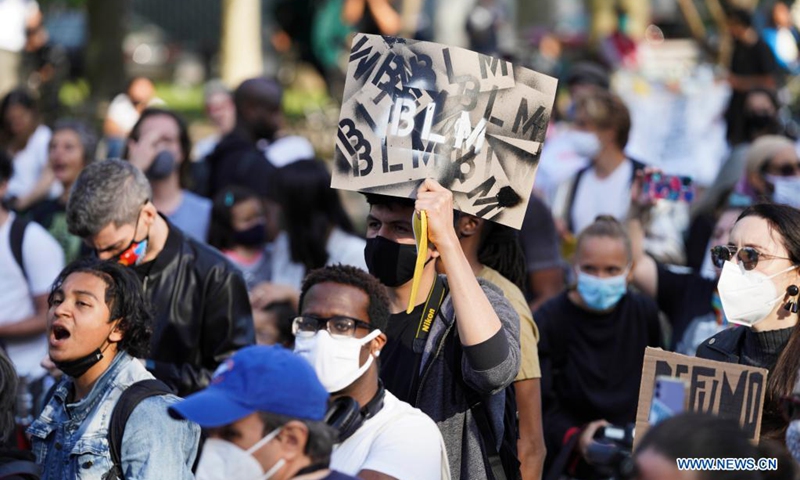Worst illness of imperialism: Scholars reveal aggravating US racism, attacks on Xinjiang during pandemic in new book

People attend a rally to mark the one-year anniversary of George Floyd's death in Cadman Plaza Park in New York, the United States, May 25, 2021.(Photo: Xinhua)
Chinese and foreign scholars expressed their concerns over escalated racial discrimination and violence, especially amid the COVID-19 pandemic, discussing the reasons why they are hard to be eliminated in the Western society, in a published collection of essays. The scholars argued in their works that instead of caring about human rights, the US hyped topics on China’s Xinjiang region to shift blame from its own various issues.
The collection, titled Between Ignorance and Murder – Racism in Times of Pandemics, was published by the Vienna Academic Press against the backdrop of the George Floyd’s murder and rising anti-Asian crimes in the West and the US amid the COVID-19 pandemic. The papers collected are mainly by scholars and experts from China, the US, Netherlands, Germany and South Africa, who attended the international seminar on global COVID-19 prevention and human rights protection, which was held in Changsha on July 3, 2020.
Its main editors include Peter Herrmann, whose recent positions span from the Max-Planck Institute for Social Law and Social Policy in Munich over the Faculty of Economics and Sociology of Lodz in Poland, to currently being research fellow at the Human Rights Centre of Central South University; Tom Zwart, a Professor of Cross-cultural Law at Utrecht University; Mao Junxiang, executive director and professor at the Human Rights Studies Center at Central South University; and Peng Qinxuan, an expert from the Wuhan University Institute of International Law.
These papers discuss race discrimination in the West from different angles. For example, Brij Mohan, Dean Emeritus of School of Social Work in Louisiana State University, pointed out in his paper that during the coronavirus pandemic, poor and black families have disproportionately suffered the ravages of natural catastrophe as well as social suppression. The inequality is mainly driven by ideologies that sustain the privilege of white people, systemic brutality and injustice.
Herrmann argues in his paper titled “Racism – a matter of daily killing or: the denial of the stranger” that human existence is always essentially about social existence. Thus, the murder of George Floyd had been the suffocation of a man, and also part of the killing of social spaces of society.
Herrmann told the Global Times that he experienced such hostility too, or at least rejecting reactions when he mentioned that he was “from China” – he works at the Central South University.
He said that racism is too often more visible when there are extreme excesses as in such disgraceful individual cases as that of George Floyd. “However, this way we tend to overlook that racism is very much a specific phenomenon of xenophobia, of the unknown, the thinking of greed, undermining solidarity. We are confronted with a deep-seated notion, occurring as individual attitude while it is in fact a phenomenon of imperial strives for power.”
When talking about Western politicians’ attacks of China’ Xinjiang region, Herrmann said that “we may draw a connection” between the book on racism and the anti-China attitudes with the pandemic and the accusations on Xinjiang.
The US is a “declining empire” and attributes its decline to “various developments and movements in other parts of the world, not least China. The easiest way to absolve yourself is to blame the other,” Herrmann said.
The scholar noted that US former Secretary of State, Mike Pompeo, just like most of his predecessors and other former members of the cabinet, have used many opportunities to distract public attention from what went on in the realm of his office – like the killing of George Floyd, a lax judgment on the murderer, and the numerous victims of the pandemic those deaths could have been avoided, Herrmann said.
He emphasized as well the importance of seeing racism in a general light – “even if you are not victim right now, you may be the other day. Take the US politics: one day they attack people of color, the other day Chinese, then they may come up with somebody else. There is a paradox: while racism does exist and is one of the worst illnesses of imperialism, races do actually not exist: we are all just human beings, with equal rights, obligations and responsibilities.”
Kerish Chetty, a chief researcher at the Inclusive Economic Development Division of the Human Sciences Research Council in South Africa, said that in his paper, he wants to highlight the dreadful impacts of inequality which is delineated along racial lines in South Africa.
In the panic of the pandemic, poor people, who are generally black in South Africa, were treated much worse than their wealthier counterparts. “I therefore hope our contribution shines a light on what inequality leads to and adds to calls for actions that will extricate people out of poverty,” said Chetty.
Chetty said that it is wrong to politicize the pandemic and when talking about human rights, Chetty added that “the US has no interest in promoting human rights.”
“The US and its media cannot talk about China violating the rights of people while ignoring its own terrible track record of human rights violations across the world, be it in Iraq, Guantanamo Bay, its treatment of migrants, or its exploits during the Cold War, among several others. The US chooses to vilify China as China threatens its political and technological base of power,” Chetty told the Global Times.

